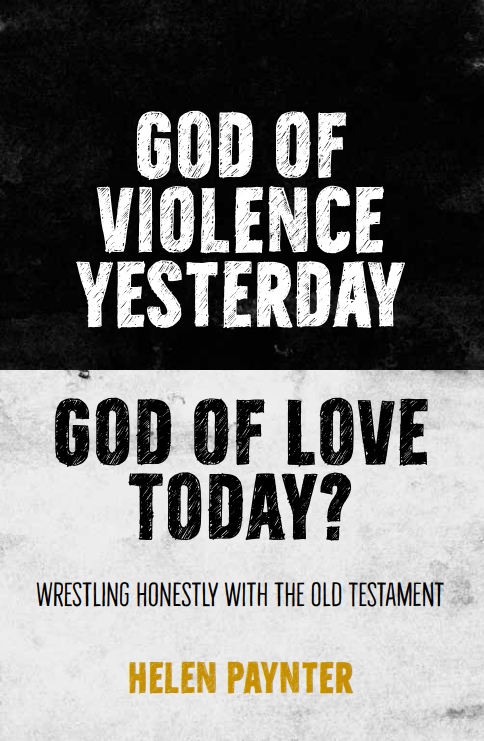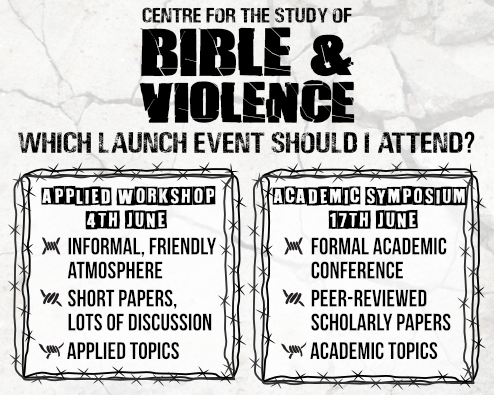Wrestling with Old Testament violence

How did you become particularly engaged in Old Testament violence?
About 12 or 13 years ago, I took a phone call one evening from our church youth worker. I’m not sure why she phoned me, because I didn’t have any particular expertise to answer her question – desperation, I suspect! Her issue was this: one of the young people in her care had started reading the Old Testament seriously, and was so disturbed by the stories of violence that she encountered there that she was in danger of losing her faith.
That phone call drew my attention to these stories in a new way and made me concerned to try to think hard about how we should interpret them.
What have you attempted to do in the book?
I’m trying to address the question: is the Old Testament God different from the New Testament God? Can we read our Old Testaments and still believe that God is good? This is my best effort to grapple with Old Testament violence in a book that is intended for anyone who is willing to think hard about the issues. (In other words, it’s aimed at non-specialists.)
Not all Old Testament violence is the same, so I have tried to break the problem down. I begin with some essential starting points for the interpretation of the Bible and our understanding of the nature of violence. What is violence in modern and ancient society? How does the Old Testament relate to the New? What does it mean when we say that Scripture is inspired by God? What are the important principles that we need to bear in mind as we try to interpret the Bible?
After that, I work my way towards the most problematic texts by way of the easier ones. We end up with the knottiest problem of all, the texts where God appears to command people to be violent to one another. And though I don’t believe there are any final, definitive answers to this issue, I do my best to provide some strategies to help us understand what is going on. However, it is not a whitewash - I am completely committed to being honest about the problems that I am unable to resolve.
At the end of most of the chapters in this section I try to provide some more practical suggestions. How should we handle these texts in our churches – in our pulpits, our home-groups, our Sunday Schools?
What are your hopes for it?
My hope is that if this book were to fall through a time warp into the hands of the teenager whose struggle sparked my interest in the first place, she would find it helpful. And, even though some of her questions might remain, that she would conclude that belief in a good God is not incompatible with reading the Old Testament. And it is my hope and prayer that it will do the same for all its readers.
I also hope that it will help to readers to develop good interpretative practice when reading the Old Testament.
How does the book relate to your Whitley Lecture?
In the Whitley Lecture I addressed the question of how to read texts of Old Testament violence ethically. I made no attempt to offer an interpretation, explanation or apologia for them, although it was clear as I went around that many people in the audience had come hoping to hear one. I was writing this book as I did my Whitley tour, and I am grateful for the questions and conversations that I had at the various locations I visited, as they helped me to understand the pressing issues that are bothering people, and shaped my development of this book.
The recent report of a Home Office official using violence in the Bible as a justification for denying an asylum application was an example of how bad and misunderstood theology can have a direct impact on someone’s life. How did you respond to this?
I wrote to the Minister of State for Immigration, and also sent a tweet to the Home Secretary. I offered the services of the Centre for the Study of Bible and Violence to provide some staff training in the issue, or to have a meeting to discuss the matter. I think we are ideally placed to be able to help the Home Office with this issue. I haven’t yet heard back, but I still hope to.
As you become more engaged in this issue, are you seeing more misuse of the Bible? A growing understanding and better reading of it? What are you sensing?
Misuse of the Bible is certainly a historical phenomenon, and I have known this for a while. What I have been surprised (and shocked) by in recent months is the way in which it continues to be used to promote violence. I could give many examples, and highlighted some here.
My current project is writing a book that attempts to counter the ways in which some perpetrators of domestic violence use the Bible to seek to ‘justify’ what they are doing, or to manipulate those they are abusing (usually wives) into staying in the situation. Following that I intend to engage with the extreme nationalism/ far right situation, where the Bible is also being co-opted to a violent agenda.
The Revd Dr Helen Paynter is an Old Testament tutor at Bristol Baptist College and director of the newly established Centre for the Study of Bible and Violence. She delivered the 2018 Whitley Lecture.
Her new book God of Violence Yesterday, God of Love Today?: Wrestling honestly with the Old Testament is published by the Bible Reading Fellowship (BRF) and can be pre-ordered here. It is published on 24 May, and will be officially launched on 4 June (see below). Copies are available from our online shop.
The Centre for the Study of Bible and Violence launched in November with twin aims:
-
to promote postgraduate research in the broad field of Bible and violence; and conversation among scholars of different faiths, nationalities and disciplines who are working in related areas. (academic arm). The launch symposium for the academic arm of the Centre takes place on 17 June. The Centre invited submissions for its launch symposium (academic arm). For this inaugural meeting, all scholarly research papers on the broad subject of Bible and Violence will be considered.
-
to provide resources to the churches in order to equip them to offer a counter-violence, counter-extremist narrative; and to promote confidence in the value of the Old Testament and the goodness of God. (applied arm) The launch event for the applied arm of the Centre takes place on 4 June, and will also see the launch of Helen's new book.
This event is aimed at ministers and others who are interested in practical questions relating to the Bible and Violence.

Do you have a view? Share your thoughts via our letters' page.
Baptist Times, 14/05/2019